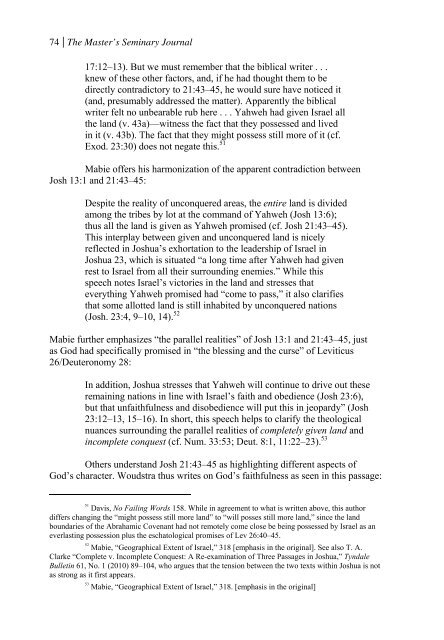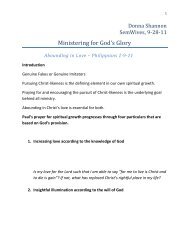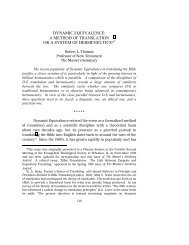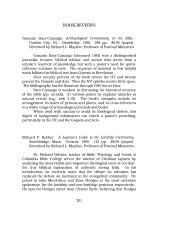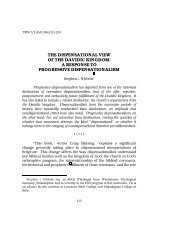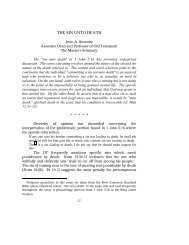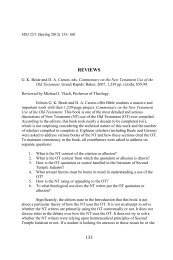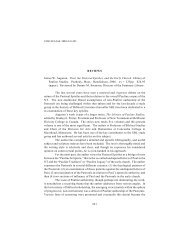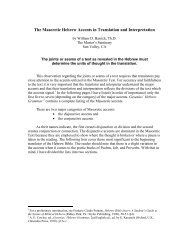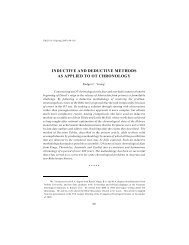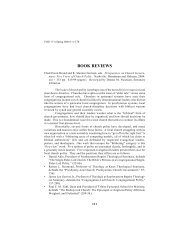Did God Fulfill Every Good Promise? - The Master's Seminary
Did God Fulfill Every Good Promise? - The Master's Seminary
Did God Fulfill Every Good Promise? - The Master's Seminary
You also want an ePaper? Increase the reach of your titles
YUMPU automatically turns print PDFs into web optimized ePapers that Google loves.
74 | <strong>The</strong> Master’s <strong>Seminary</strong> Journal17:12–13). But we must remember that the biblical writer . . .knew of these other factors, and, if he had thought them to bedirectly contradictory to 21:43–45, he would sure have noticed it(and, presumably addressed the matter). Apparently the biblicalwriter felt no unbearable rub here . . . Yahweh had given Israel allthe land (v. 43a)—witness the fact that they possessed and livedin it (v. 43b). <strong>The</strong> fact that they might possess still more of it (cf.Exod. 23:30) does not negate this. 51Mabie offers his harmonization of the apparent contradiction betweenJosh 13:1 and 21:43–45:Despite the reality of unconquered areas, the entire land is dividedamong the tribes by lot at the command of Yahweh (Josh 13:6);thus all the land is given as Yahweh promised (cf. Josh 21:43–45).This interplay between given and unconquered land is nicelyreflected in Joshua’s exhortation to the leadership of Israel inJoshua 23, which is situated “a long time after Yahweh had givenrest to Israel from all their surrounding enemies.” While thisspeech notes Israel’s victories in the land and stresses thateverything Yahweh promised had “come to pass,” it also clarifiesthat some allotted land is still inhabited by unconquered nations(Josh. 23:4, 9–10, 14). 52Mabie further emphasizes “the parallel realities” of Josh 13:1 and 21:43–45, justas <strong>God</strong> had specifically promised in “the blessing and the curse” of Leviticus26/Deuteronomy 28:In addition, Joshua stresses that Yahweh will continue to drive out theseremaining nations in line with Israel’s faith and obedience (Josh 23:6),but that unfaithfulness and disobedience will put this in jeopardy” (Josh23:12–13, 15–16). In short, this speech helps to clarify the theologicalnuances surrounding the parallel realities of completely given land andincomplete conquest (cf. Num. 33:53; Deut. 8:1, 11:22–23). 53Others understand Josh 21:43–45 as highlighting different aspects of<strong>God</strong>’s character. Woudstra thus writes on <strong>God</strong>’s faithfulness as seen in this passage:51Davis, No Failing Words 158. While in agreement to what is written above, this authordiffers changing the “might possess still more land” to “will posses still more land,” since the landboundaries of the Abrahamic Covenant had not remotely come close be being possessed by Israel as aneverlasting possession plus the eschatological promises of Lev 26:40–45.52Mabie, “Geographical Extent of Israel,” 318 [emphasis in the original]. See also T. A.Clarke “Complete v. Incomplete Conquest: A Re-examination of Three Passages in Joshua,” TyndaleBulletin 61, No. 1 (2010) 89–104, who argues that the tension between the two texts within Joshua is notas strong as it first appears.53Mabie, “Geographical Extent of Israel,” 318. [emphasis in the original]


